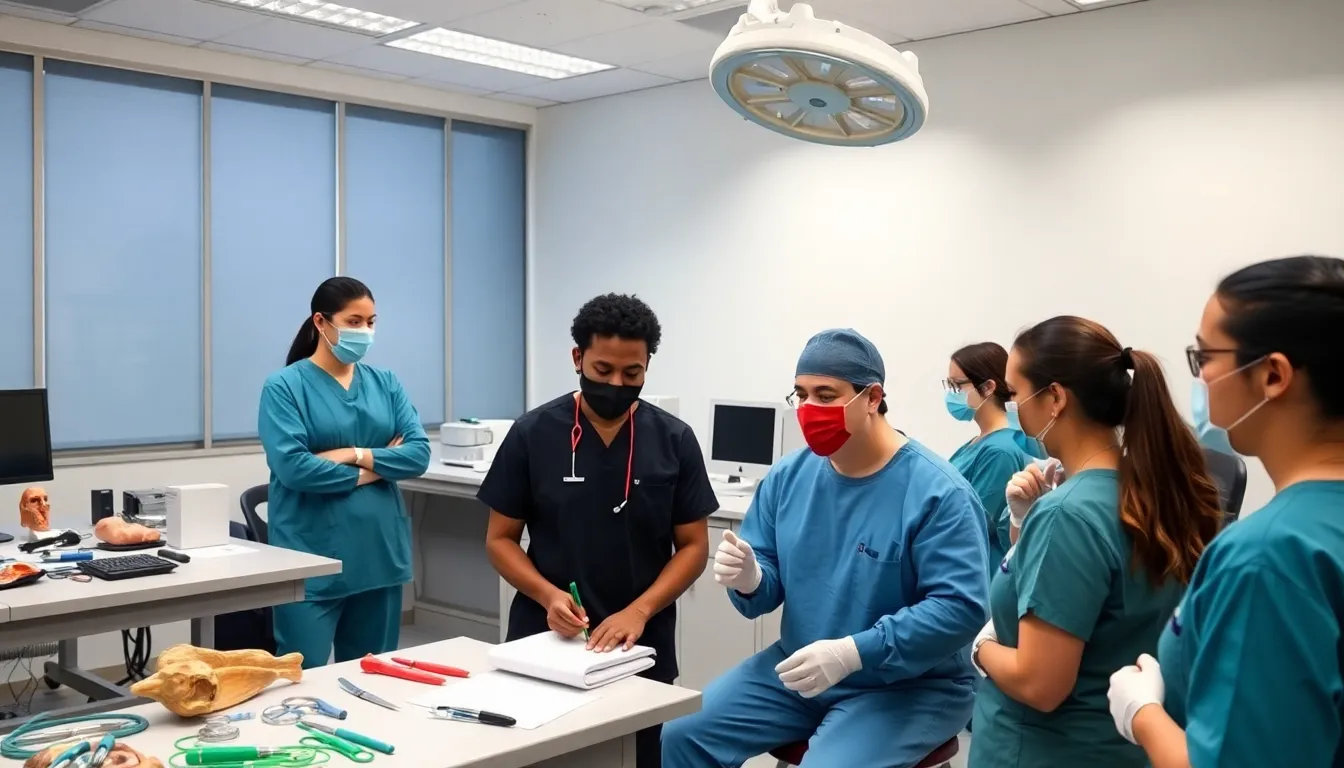In the fast-paced world of healthcare, scrub techs are the unsung heroes behind the scenes, making surgical magic happen. Ever wondered how those skilled professionals get their start? Enter scrub tech programs, the gateway to a rewarding career that combines precision, teamwork, and just the right amount of adrenaline.
Table of Contents
ToggleOverview of Scrub Tech Programs
Scrub tech programs educate students on the skills needed for a career as a surgical technologist. These programs typically last between 9 to 24 months, depending on the type and institution. Students gain hands-on experience through clinical rotations in healthcare settings, which prepares them for real-life situations.
Curriculum components include anatomy, surgical procedures, infection control, and instrument sterilization techniques. Classes emphasize the importance of teamwork, as scrub techs often collaborate with surgeons and nurses. Examinations and certifications, such as the Certified Surgical Technologist (CST) credential, usually become essential upon program completion.
Programs may vary in format, offering options for online or hybrid learning to accommodate diverse student schedules. Financial aid opportunities often exist, making it easier for individuals to pursue their education. Accreditation plays a vital role in ensuring program quality, as applicants should verify that the program holds recognition from an authoritative body.
Potential career paths include positions in hospitals, surgical centers, and outpatient facilities. Employment opportunities frequently extend to various surgical specialties such as orthopedic, cardiovascular, and neurosurgery. Graduates can expect a competitive salary, with an annual median wage for surgical technologists reported at approximately $49,000.
Understanding the responsibilities of scrub techs and the training involved prepares students for a fulfilling career in the surgical environment. Each program equips individuals with the essential knowledge and practical skills needed to excel during surgical procedures.
Types of Scrub Tech Programs

Various types of scrub tech programs exist, each designed to meet the diverse needs of aspiring surgical technologists. These programs typically focus on equipping students with the skills and knowledge necessary for success.
Diploma Programs
Diploma programs offer a fast track into the surgical technology field. These programs usually last 9 to 12 months and provide essential training in basics like anatomy, surgical procedures, and sterile techniques. Students engage in hands-on learning through clinical rotations, which prepares them for real-world settings. Many diploma programs are accredited, ensuring the quality of education. Graduates often seek certification to enhance their employability.
Associate Degree Programs
Pursuing an associate degree in surgical technology takes about 18 to 24 months. These comprehensive programs cover in-depth subjects such as advanced surgical techniques and patient care. Students participate in both classroom instruction and clinical experiences, fostering strong communication and teamwork skills. The associate degree often leads to more job opportunities in specialized areas. Also, graduates may receive credits toward further education, allowing for career advancement.
Certification Programs
Certification programs focus on validating the skills of current scrub techs. These programs typically require candidates to meet certain prerequisites, such as completing an accredited educational program or acquiring work experience. The Certified Surgical Technologist (CST) credential is one of the most recognized in the field. Candidates prepare for the certification exam through targeted review courses. Earning certification often elevates a scrub tech’s professional standing and opens doors to higher-paying positions.
Curriculum and Skills Learned
Scrub tech programs provide a comprehensive education that equips students with essential skills for a surgical technologist career. Students delve into various critical areas, ensuring deep knowledge and practical experience.
Surgical Procedures and Techniques
Surgical procedures form a cornerstone of scrub tech education. Students learn to assist in various operations, including orthopedic, cardiovascular, and neurosurgery. Instruction focuses on understanding surgical instruments, assisting with patient positioning, and maintaining a sterile environment. Techniques for preoperative and postoperative care are also covered, enhancing their involvement in the operating room. Graduates acquire practical skills to anticipate the needs of surgical teams, improving efficiency and patient outcomes.
Patient Care and Safety
Patient care and safety play pivotal roles in scrub tech training. Students examine safety protocols and learn infection control measures critical to protecting patients during surgery. Training involves understanding patient privacy rights and developing communication skills. Knowledge gained here empowers scrub techs to address concerns and advocate for patients effectively. Emphasis on cultivating a compassionate approach fosters a supportive environment, ensuring that patients feel secure and informed.
Instrument Sterilization and Maintenance
Instrument sterilization and maintenance are integral components of scrub tech curricula. Students master various sterilization techniques, including autoclaving and chemical methods, ensuring instruments are safe for use. Training covers daily maintenance routines and handling protocols, reducing the risk of cross-contamination. Expertise in this area enables scrub techs to uphold high standards of hygiene in surgical environments. Attention to detail in instrument care lays the foundation for effective teamwork within surgical settings.
Career Opportunities and Job Outlook
Surgical technologists, commonly known as scrub techs, enjoy a promising career outlook. The U.S. Bureau of Labor Statistics projects a job growth rate of 7% from 2021 to 2031 for this profession, reflecting increased demand in healthcare settings. Many hospitals and surgical centers actively seek qualified scrub techs, thus enhancing job security for graduates.
Employment opportunities exist in various environments, including hospitals, outpatient surgical centers, and specialized clinics. Surgical specialties like orthopedic, cardiovascular, and neurosurgery often require scrub techs, providing diverse career paths. Graduates frequently join teams that emphasize collaboration, ensuring patient safety and quality care during operations.
Earning potential ranks among the attractive aspects of this career. The annual median wage for surgical technologists stands at approximately $49,000, although factors such as experience and location can influence salaries. Many professionals also enjoy benefits like health insurance and retirement plans, enhancing overall job satisfaction.
Career advancement often follows experience. Surgical technologists may pursue additional certifications or specializations, which can increase job prospects and wages. Some professionals transition into roles like surgical first assistants or educators, opening even more avenues for growth.
Networking and professional organizations play vital roles in career development. Engaging with groups such as the Association of Surgical Technologists (AST) offers valuable resources and connections. Such involvement helps scrub techs stay updated on industry trends and continuing education opportunities.
Overall, scrub tech programs create a solid foundation for those entering this dynamic field. Career possibilities continue to expand, making surgical technology an appealing option for those seeking to contribute meaningfully to healthcare.
Scrub tech programs offer a vital pathway for those looking to build a career in the surgical field. With a strong focus on hands-on training and essential skills, these programs prepare students for the dynamic challenges of the operating room. Graduates emerge ready to contribute to patient care and surgical success, equipped with valuable knowledge and practical experience.
As the demand for skilled surgical technologists continues to grow, pursuing a scrub tech program can lead to a fulfilling and financially rewarding career. The diverse opportunities available in various healthcare settings further enhance the appeal of this profession. With the right training and dedication, aspiring scrub techs can play an integral role in the healthcare industry.





